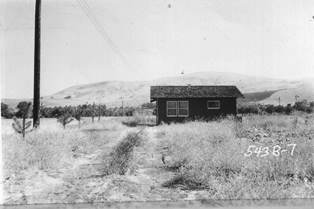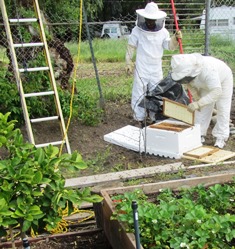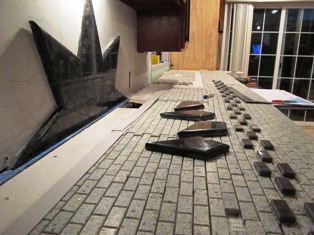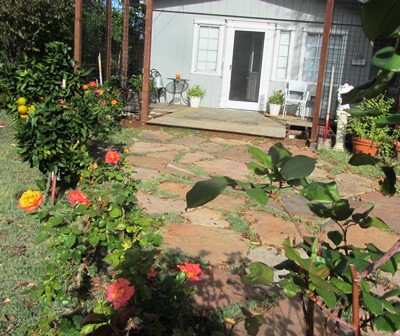How My Real Life Informs My Art
Every story needs a setting, a world in which something happens. For my cozy mysteries, I didn’t set out to create a new world for my coterie of characters, I just appropriated details of the life I am living as a farmette dweller.
Daily chores on our Henny Penny Farmette provide plenty of fodder for my fictional stories. Our daily activities include chicken care, garden and orchard work, beekeeping, cooking and preservation of vegetables and fruits, renovating the antiquated farm house, fixing sheds, and building fences and retaining walls.
Stories need a sense of verisimilitude for readers to suspend disbelief and join the fictional journey. Drawing upon my real-life experiences, I can easily integrate my adventures in my books. And not only my activities, but also experiences of my architect husband who is ever-occupied with making our old house more liveable.

In this 1953 photo, our little house sat in a great, big field with not much around it; the dwelling faced Mount Diablo (still does) and the Delta and great central valley lie to the northeast
The tax assessor told me that our dwelling might have been a mining shack in the late 1940s (we live near Mt. Diablo and Lime Ridge where mining and rock quarrying were once important industries). We’ve also been told that our little house might have later served as a farm home (we live less than two miles from designated agricultural farmland). The structure desperately needed updating when we found it almost five years ago. But as settings go, the house and farmette work great.
We have since used recycled and reclaimed materials, sale items at big box DIY stores, and gifts (like lumber, stone, and windows/doors) from friends who do demolition on estates. We’ve visited companies that sell granite and asked for permission to take broken stone from their dumpsters. Thus, we’ve created a lovely bathroom floor with found materials that we’ve cut and sanded.

Light from a crystal chandelier dances off the new granite counter, but the floors were not yet installed when this photo was taken
Of course, the exact details of our daily activities may not make their way into my stories, but versions of them sometimes do. At the very least, such activities inform my storytelling. I daresay the chickens and bees serve important roles in my mysteries. And each new day brings new adventures, from foxes showing up to skunks and raccoons raiding our fruit and nut trees.
Lately, a new chicken showed up on our property (a heritage chicken that had the ability to fly over my neighbor’s fence). She’s been staying here ever since. Wild turkeys often take a path through the property and once or twice a gorgeous stallion named Romeo and its owner ride by and say hello. Such events can add textural details to the setting of a story.
Farmette Projects Don’t Stop, Even with the Rain
The rains have arrived in the Bay Area . . . finally. Although my hubby and I are thankful for the wet stuff, we weren’t quite ready.
Our sheds have leaky roofs. I also need to install a different kind of gate on my chicken run; one that won’t swell with moisture and get stuck so that I can’t open it. I close the gate at night against predators, but the chickens free range in the yard during the day.
Our supply of building materials is dwindling as we are completing some projects. Much of the stone and retaining wall materials, torn out from estates that are being re-landscaped, were donated to us. Carlos and I were only too glad to integrate them into our own landscape. We work on it little by little.
With mud everywhere, I probably appreciate more than anyone having the flagstone leading to the front door, however, we still need to fill the spaces between the flagstone with gravel.
We’ve built fences and put up the frame for an entrance trellis where the gate will go in. We also have constructed a porch trellis that I will grow wisteria over, but we have to install the porch floor first. We’re using plywood in the meantime.
The long half-circle driveway is packed dirt, although we have shoveled in gravel where my husband parks his truck. Now that the rains have arrived, the driveway is pretty muddy. We need to figure out whether we’ll put in gravel for entire length of the driveway (there’s some there now) or lay asphalt or stone.
So while it rains, I think about our master plan for the farmette. We’ve come a long way . . . but there’s still a huge distance to go and some projects can’t wait for spring like those leaky shed roofs.
 Facebook
Facebook Goodreads
Goodreads LinkedIn
LinkedIn Meera Lester
Meera Lester Twitter
Twitter








